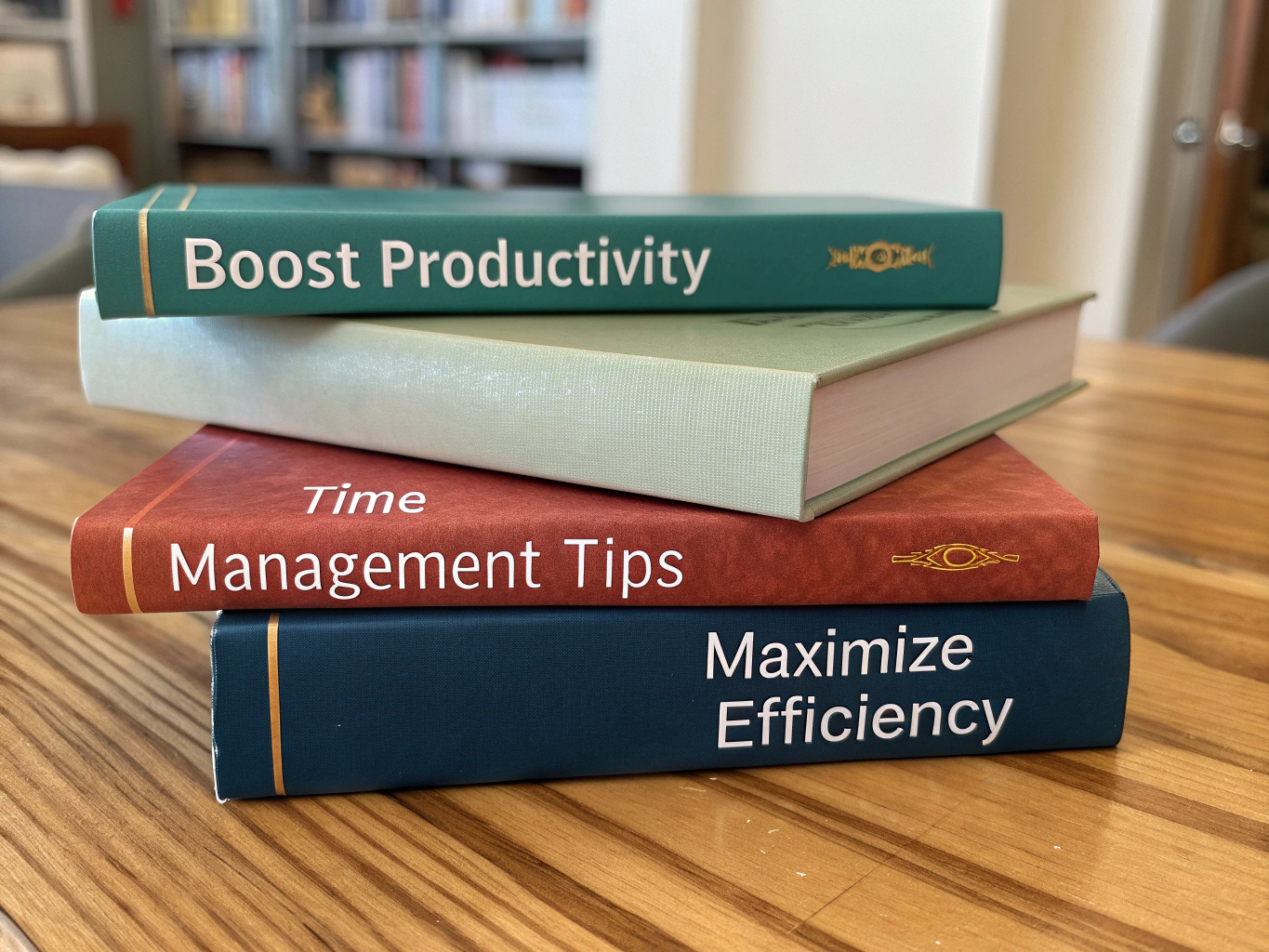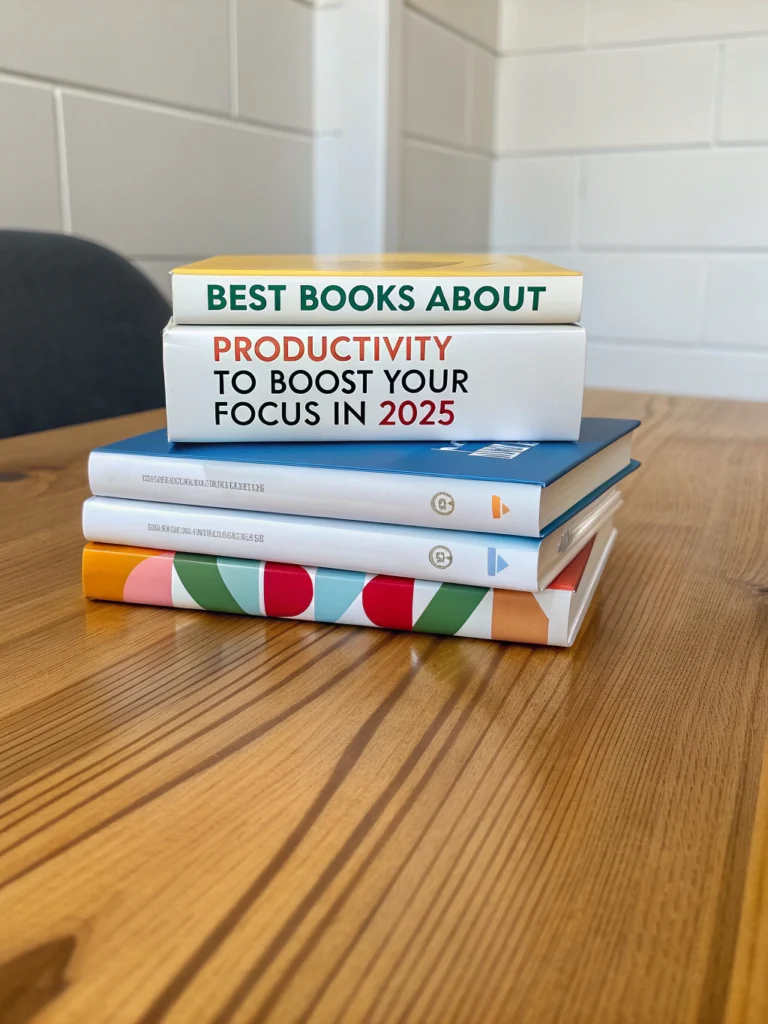Best Books About Productivity to Boost Your Focus in 2025
Looking for the best books about productivity to transform your work life in 2025? You've landed in the right place. In today's fast-paced world, mastering focus and efficiency isn't just nice to have—it's essential for success.
As someone who's tested countless productivity systems (and failed at many), I've compiled this no-fluff guide to the most impactful productivity books 2025 has to offer. These aren't just any books—they're game-changers that have helped thousands reclaim their time and attention in meaningful ways.
Let's dive into the reads that will actually move the needle on your productivity this year.
Why Reading About Productivity Matters in 2025
Before jumping into specific titles, let's get real—why bother with productivity books when you could just watch a YouTube video?
Here's the truth: books to boost focus provide depth that quick-fix content simply can't match. They give you comprehensive systems, not just hacks that work for a week.
In 2025, with AI handling more of our routine tasks, human productivity is shifting toward deep work, creative thinking, and strategic decision-making—precisely the skills these books help develop.
Top Productivity Reads of 2025
1. Atomic Habits by James Clear
Still relevant in 2025, this book transforms how you think about tiny changes. Clear shows how 1% improvements compound dramatically over time.
What makes it special:
- Practical four-step model for building better habits
- Science-backed strategies that actually stick
- Real-world examples that inspire action
Perfect for: Anyone struggling with consistency or who feels overwhelmed by big goals.
2. Deep Work by Cal Newport
In an age of constant distraction, Newport's guide to concentrated work has become even more valuable. This classic teaches how to cultivate intense focus—a superpower in 2025's attention economy.
Key takeaways:
- How to structure your day for maximum deep work
- Techniques to train your concentration muscle
- Methods for eliminating distractions permanently
Perfect for: Knowledge workers who feel constantly interrupted and unable to produce their best work.
3. Four Thousand Weeks by Oliver Burkeman
This refreshingly honest book acknowledges our limited time (about 4,000 weeks in a human life) and offers a philosophical yet practical approach to productivity.
Why it's revolutionary:
- Challenges toxic productivity culture
- Provides frameworks for meaningful prioritization
- Helps you accept limitations while still achieving more
Perfect for: People feeling burnt out by traditional productivity advice who want a more sustainable approach.

4. Hyperfocus by Chris Bailey
One of the best books to boost focus in recent years, Bailey combines neuroscience and practical application in this guide to directing your attention where it matters most.
Standout concepts:
- Distinguishing between hyperfocus and scattered attention
- Creating environments that support deep concentration
- Managing digital distractions effectively
Perfect for: Anyone diagnosed with ADHD or who struggles with focus in our notification-filled world.
Speaking of ADHD, if you're specifically looking for tools to manage attention challenges, check out the >ADHD Productivity Power Pack: Ebooks, Guides, Checklists, Workbook & Tools to Master Focus, Time Management & Organization. This comprehensive resource has helped thousands manage their attention more effectively.
5. The One Thing by Gary Keller
In a world of infinite options, Keller brings clarity with a simple question: "What's the ONE thing I can do such that by doing it everything else will be easier or unnecessary?"
Game-changing ideas:
- The focusing question that cuts through overwhelm
- Time-blocking techniques that protect your priorities
- Domino effect of sequential achievement
Perfect for: Entrepreneurs and professionals juggling multiple responsibilities who need to prioritize effectively.
Best Time Management Books for 2025
Mastering your schedule is critical for productivity, and these time management books deliver systems that work:
6. Make Time by Jake Knapp and John Zeratsky
Former Google designers offer a playful yet effective approach to reclaiming your day with their "highlight" method.
What you'll learn:
- How to select and protect your daily highlight
- Energy management techniques that complement time management
- Simple ways to reduce technology distractions
Perfect for: Busy professionals who feel like their days slip away without accomplishing what matters.
7. When: The Scientific Secrets of Perfect Timing by Daniel Pink
Pink reveals how timing isn't just an art—it's a science you can master to boost productivity.
Revolutionary concepts:
- Optimal timing for different types of work based on your chronotype
- The hidden patterns of the day that affect your performance
- Strategic use of breaks to maintain high productivity
Perfect for: Anyone looking to optimize their schedule based on their natural energy rhythms.
For those looking to leverage technology in their productivity systems, the >AI for Productivity eBook + Checklist: Supercharge Your Efficiency in 2165 provides cutting-edge strategies for integrating AI into your workflow.
Productivity Books for Specific Challenges
Different productivity obstacles require specialized approaches. These targeted reads address common challenges:
8. Indistractable by Nir Eyal
Eyal, who once wrote about making products addictive, now offers the antidote to digital distraction.
Key frameworks:
- Four-part model for becoming "indistractable"
- Techniques for managing internal triggers that lead to distraction
- Strategies for creating "pacts" that prevent unwanted behaviors
Perfect for: Digital professionals constantly interrupted by notifications, emails, and social media.
9. Essentialism by Greg McKeown
McKeown's philosophy of "less but better" provides a framework for eliminating the nonessential.
Transformative ideas:
- The disciplined pursuit of less (but better quality)
- Decision-making frameworks for what truly matters
- Permission to eliminate the merely "good" to focus on the great
Perfect for: Overcommitted professionals who need to scale back and focus on impact over activity.
Check out our guide to desk productivity tools to complement your reading with a well-organized workspace.
10. Free to Focus by Michael Hyatt
Hyatt's comprehensive productivity system balances achievement with rejuvenation.
System highlights:
- The three-step productivity formula: Stop, Cut, Act
- Permission-based approach to rest and rejuvenation
- Practical tools for delegation and automation
Perfect for: Leaders and managers who need to balance personal productivity with team development.
Emerging Productivity Theories for 2025
The productivity landscape continues to evolve. These newer titles represent cutting-edge focus and productivity tips:
11. Digital Minimalism by Cal Newport
Newport's follow-up to Deep Work addresses the digital clutter suffocating our attention spans.
Revolutionary ideas:
- The philosophy of technology use based on your values
- 30-day digital declutter process
- Building a meaningful offline life
Perfect for: Anyone feeling overwhelmed by digital tools and social media platforms.
12. Hyperfocus in the AI Age by Lauren Roberts
This 2025 release addresses productivity in collaboration with AI tools—a must-read for the modern workplace.
Fresh concepts:
- Cognitive partnering with AI assistants
- Maintaining human creativity in automated workflows
- Ethical boundaries for AI delegation
Perfect for: Knowledge workers integrating AI into their daily workflows.
For more productivity boosting ideas in 2025, see our article on meditation and productivity hacks.
How to Actually Apply What You Read
The true value of productivity books 2025 isn't just in reading them—it's in applying their principles. Here's my three-step system for getting results:
Read with intention: Don't passively consume. Highlight key concepts and write margin notes on how you'll apply ideas.
Implement one system at a time: Trying to change everything at once leads to nothing sticking. Choose one book's methodology and practice it for at least 21 days.
Create accountability: Share your productivity goals with someone who'll check in on your progress.
If you're looking to boost your focus with visual cues, our guide to productivity desktop background ideas offers practical solutions.
Beyond Books: Complementary Resources
While books provide the foundation, consider these complementary resources to improve productivity 2025:
- Productivity journals: Structured reflection tools like the 5-Minute Journal
- Digital tools: Apps like Notion, Todoist, and Forest
- Community: Join productivity-focused groups for accountability and idea sharing
For a comprehensive system, explore the productivity method planner guide to find a framework that matches your work style.
Productivity Books to Avoid
Not all productivity advice is created equal. I recommend skipping:
- Books promising overnight transformation
- Those with rigid systems that don't adapt to individual differences
- Outdated advice that doesn't account for current technology
Final Thoughts
The best books about productivity don't just help you do more—they help you do what matters. As you explore these recommendations, remember that productivity isn't about squeezing more into your day but making space for what truly counts.
Whether you're struggling with focus, time management, or digital distraction, there's a book on this list that can transform your approach to work and life in 2025.
What productivity book has most influenced your work habits? And which from this list are you planning to read next? The journey to better productivity starts with a single page turn.
FAQ: Books About Productivity
Which productivity book is best for beginners?
For beginners, "Atomic Habits" by James Clear offers accessible, practical advice that's easy to implement. It focuses on small changes that create significant results over time.
How many productivity books should I read at once?
I recommend reading just one productivity book at a time and implementing its systems for at least three weeks before moving to another. This allows you to properly test whether the approach works for your specific needs.
Are audiobooks as effective as physical books for learning productivity systems?
Audiobooks can be excellent for absorbing concepts, but physical books or ebooks make implementation easier since you can highlight, take notes, and reference specific techniques. Consider using both: listen first, then reference the physical copy when implementing.
How can I find time to read productivity books when I'm already busy?
Start with just 15 minutes each morning before other obligations take over. Consistency matters more than duration. Also, consider audiobooks during commutes or exercise for efficient learning.
How do I know if a productivity system from a book is working for me?
Track your results over at least three weeks. Effective productivity systems should provide a sense of control, reduce stress, and help you consistently complete important tasks. If you're not seeing these benefits, the system might not match your work style.

